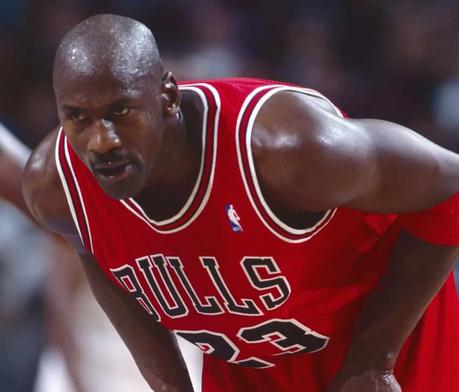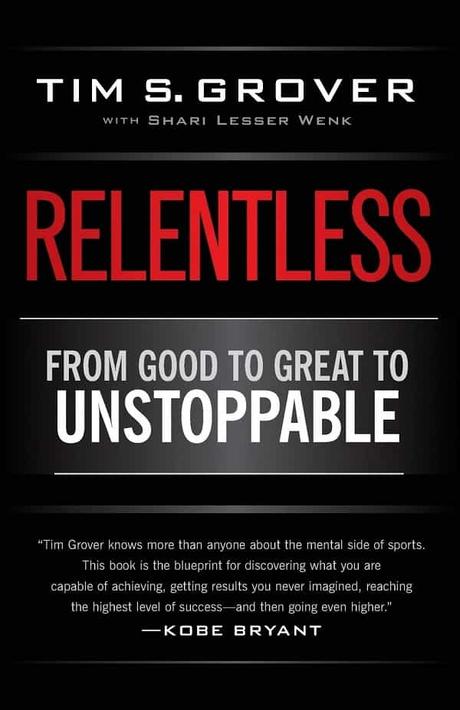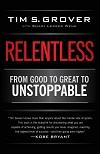 Rich Kane Photography / Alamy Stock Photo
Rich Kane Photography / Alamy Stock Photo
Tim Grover is a strength and conditioning trainer, best known for his work with elite athletes, including Michael Jordan, Dwayne Wade, and Kobe Bryant.
As a 25-year old trainer, Grover got his start with Michael Jordan in the early 1990s. Jordan’s Bulls had been dominated for the second year in a row in the playoffs by the more physical Detroit Pistons. Jordan had had enough, and wanted to start dishing out some punishment around.
And this meant putting on some muscle. Jordan met with Grover, and the rest was history. Jordan put on 15 pounds of muscle, the Bulls got over the Pistons, and they would go on to win six NBA titles.
Grover’s book, Relentless: From Good to Great to Unstoppable, reveals the mindset of the best athletes on the planet. He reveals a list of thirteen characteristics of “Cleaners,” the apex athlete who will not be denied.
In outlining what makes the elite of the elite so elite, Grover includes examples of his famous clients and applications for the rest of us, people who aren’t necessarily trying to go back-to-back with titles.
Grover’s tone is straight-up tough love. He is unapologetic about what the top tier of excellence requires. At the very beginning Grover explains that this isn’t a paint-by-numbers template or recipe for greatness. Rather, it’s a road-map for what kind of attitude and mindset you should have. Charting the path and doing the work is and will always be on you.
Relentless is a fantastic addition to any collection of mental toughness books for athletes. You don’t need to be involved in high-level sport to get a ton of motivation and perspective from this book.
Below are a bunch of my favorite quotes and passages from Relentless: From Good to Great to Unstoppable. There are also some notes and thoughts of my own.

Where to Buy – Relentless: From Good to Great to Unstoppable by Tim Grover
Print (Paperback) | Audiobook
On working with Michael Jordan…
His relationship with MJ began in the aftermath of another Bulls’ loss to the physical Detroit Pistons in the NBA playoffs. Jordan was reluctant to work with a strength trainer. The dogma at the time was that getting stronger would alter your shooting technique, and “Michael had worked with a trainer once, injured his back during the workout, and was hesitant about trying again.”
“We learned from each other. We never saw obstacles of problems, we only saw situations in need of solutions… We learned, we made mistakes, we learned from our mistakes.”
“No matter how many times he won, no matter how great he became, he always wanted more, and he was always willing to do whatever it took—and then some—to get it.”
“Michael never cared about achieving mere greatness. He cared about being the best. Ever.”
“Michael was the only player I’ve ever known who was completely in the Zone every time he played, always a Cleaner.”
“Michael never cracked, never showed emotion… Always positive and upbeat, raising the team and everyone else, showing he had everything under control. If he ever felt anything negative, he never showed it. That’s a Cleaner.”
“Michael stayed in the Zone 100 percent of the time, from the moment he left his home or hotel room for the game until the moment he returned late that night. But during that time on the court he was the real and authentic Michael.”
“If one thing separate Michael from every other player, it was his stunning ability to block out everything and everyone else. Nothing got to him; he was ice… I’ve never seen another player form such a perfect boundary around himself, where nothing goes in except what he brings with him.”
When Michael trash-talked, “He didn’t slug anyone, he stayed steady and unemotional and turned his quiet anger into results.”
Grover notes Jordan often trash-talked as a way to ratchet up the internal pressure and expectations:
“It was another way for him to heighten the pressure he put on himself, because once you’ve told others how bad you’re about to fuck them up, you’re gonna have to deliver on that promise.”
“Even Michael used to say he had butterflies before a big game. ‘Get ‘em all going in the same direction,” I’d tell him. They’re not going away, but now you’re controlling how you feel about them, instead of allowing them to make you feel nervous. Energy instead of emotion. Big difference.”
The loneliness of excellence…
“They get what they want, but they pay for it in solitude. Excellence is lonely… Most people are afraid to climb that high, because if they fail, the fall will kill them. Cleaners are willing to die trying. They don’t worry about hitting the ceiling or the floor. There is no ceiling. There’s no floor either.”
“But when you’re never satisfied, life can be lonely. People think success will make them happy, but when you experience it, it’s usually different from what you imagined.”
The loneliness comes from the solo aspect of the climb. Because no one else has put in the same amount of dedication and hard work, you find yourself standing alone, with no one to really relate to. “Nobody else understands what you went through, or what you did to get there.”
Do the work…
“You do all of this to achieve what few others will ever comprehend or accomplish.”
“Do. The. Work. Every day, you have to do something you don’t want to do. Every day. Challenge yourself to be uncomfortable, push past the apathy and laziness and fear.”
“There are no shortcuts. I don’t want to hear about workouts you can do in five minutes a day, or twenty minutes a week; that’s total bullshit.”
“I love the guys who want results so much they’ll fight me to do more than they’re supposed to.”
The Zone is where excellence happens…
The Zone is an oddly detached place where you can perform your best without riding the emotional and mental roller-coaster of losing your focus in what’s happening around you.
Cleaners are intense, but they don’t yo-yo emotionally. Cleaners are “calm and unflappable, cool and steady, never too high or too low, never too happy or too depressed.”
“Anyone who has experienced the awesome power of the Zone will tell you it’s deeply calm. It’s not relaxing or peaceful—this isn’t yoga—but intensely focused… once you’re there, you have no fear, no worry, no emotion. You do what you came to do, and nothing can touch you.”
“Truth: when you’re finally able to let go and be who you really are, that’s what puts you in the Zone, and only then can you control your fear and inhibition.”
“It’s rare to actually see someone shift into the zone; it usually happens privately and silently.”
When you are in the Zone, there is “no fear, no intrusion… Whatever else is going on—personal, business, anything—it can’t affect him until he’s ready to return.”
When you are in the Zone, you aren’t thinking… “because thinking turns your thoughts on to everything, and the Zone is about the opposite, turning your thoughts off to everything except the task at hand. Thinking takes you away; the Zone keeps you where you need to be.”
“Thinking takes you; the Zone keeps you were you need to be. That’s your safe haven: you go inside that space, and nothing can touch you, nothing can hurt you, no one call you or text you or hassle you or bother you.”
Your internal pressure is greater than any external source…
“A cooler is never in a situation where he has to be ‘clutch.’ A Closer is ‘clutch’ in high-pressure situations. A Cleaner is always ‘clutch.’”
“There is no such thing as the ‘clutch gene.’”
“If you’re a true competitor, you always feel that pressure to attack and conquer, you thrive on it. You intentionally create situations to jack up the pressure even higher, challenging yourself to prove what you’re capable of. You’re not waiting for a critical moment to dust off some mythic ‘gene’ to showcase your greatness. You show it in everything you do, every chance you get.”
“If you’re a true competitor, you always feel that pressure to attack and conquer, you thrive on it. You intentionally create situations to jack up the pressure even higher, challenging yourself to prove what you’re capable of. You’re not waiting for a critical moment to dust off some mythic ‘gene’ to showcase your greatness. You show it in everything you do, every chance you get.”
“For Cleaners, every moment is a pressure situation, and everything is always on the line.”
“I’d be insulted if someone said I had a clutch gene. It’s not a compliment when people say you step up for the big games. Where were you all the other games? Why weren’t you that solid and aggressive and effective all the time?”
Cleaners don’t spread out the pressure. They use it to fuel themselves. They don’t look externally for help with dealing with pressure and expectations. Kobe in LA, Michael in Chicago, Dwayne in Miami; “Those are guys who at some point looked around at the rest of the league and thought, ‘I don’t want to join you, I want to beat you.’”
You can only excel by being yourself…
Elite performers are able to rely on their instincts because they have prepared themselves to such an extent that they can step back from overthinking and allow their training and instincts to take over:
“The greats never stop learning. Instinct and talent without technique just makes you reckless, like a teenager driving a powerful, high-performance vehicle. Instinct is raw clay that can be shaped into a masterpiece, if you develop skills that match your talent. That can only come from learning everything there is to know about what you do.”
“Every action becomes instinctive if you’re willing to put the time and sweat into building your arsenal of spontaneous reactions.”
“When you look inside, you see what’s real. When you look on the outside, you can only see images and what people want you to see, a manipulated picture of the truth.”
“When you’re great, you trust your instincts. When you’re unstoppable, your instincts trust you.”
The characteristics of a Cleaner…
There are thirteen characteristics of Cleaners.
- “You keep pushing yourself harder when everyone else has had enough.”
- “You get into the Zone, you shut out everything else, and control the uncontrollable.”
- “You know exactly who you are.”
- “You have a dark side that refuses to be taught to be good.”
- “You’re not intimidated by pressure, you thrive on it.”
- “When everyone is hitting the ‘in case of emergency’ button, they’re all looking for you.”
- “You don’t compete with anyone, you find your opponent’s weakness and you attack.”
- “You make decisions, not suggestions; you know the answer while everyone else is still asking questions.”
- “You don’t have to love the work, but you’re addicted to the results.”
- “You’d rather be feared than liked.”
- “You trust very few people, and those you trust better never let you down.”
- “You don’t recognize failure; you know there’s more than one way to get what you want.”
- “You don’t celebrate your achievements because you always want more.”

Print (Paperback) | Audiobook
More Stuff Like This:
19 Lessons for Athletes from “Mamba Mentality” by Kobe Bryant. Bryant modeled his game and competitive drive after Jordan. Here’s a peek under the mindset of the late Laker and one of the best to ever do it.
11 Rings: The Soul of Success (Book Summary). Bryant’s long-time coach, Phil Jackson’s journey as a coach, including advice for future leaders and background on Kobe’s development as a leader of the Lakers.
